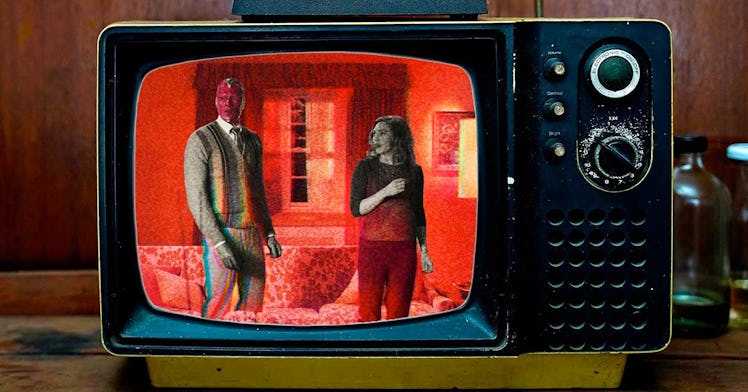‘WandaVision’ Is One Hell of a Slow-Burn
All is not as it seems in this sitcom suburbia. But, will that mystery be enough to sustain nine episodes?

The first TV series set in the Marvel Cinematic Universe isn’t trying to make you fall in love with it. Instead, WandaVision begins by assuming that you already care, which is true enough. The most popular film series on the planet is undoubtedly the superhero juggernaut of Marvel Studios, which is why the franchise decided to, you know play it safe and have the first Marvel Disney+ show be about two b-squad Avengers, living their lives inside of a sitcom.
Cue stopping record sound. Yeah, almost nothing about the set-up of WandaVision invites clarity, nor is Marvel playing it safe with their demographic. If you’re the kind of person who likes Marvel stuff because there’s a bunch of snappy dialogue in-between shit blowing up, WandaVision will not give you what you want. If you’re someone who likes weird TV shows that intentionally obscure their backstories to draw you into a season-long mystery – ala’ Twin Peaks or Westworld — then, WandaVision is going to be your new slow-burn TV jam. Imagine a Black Mirror episode like “San Junipero” but much longer, and with fewer explanations, and you’ve got the feeling of the first three episodes of WandaVision. It’s high-concept surrealist sci-fi, which also means it’s not exactly a crowd-pleaser.
In the first episode, Wanda and Vision ask each other questions that border two people starting an improv scene: “What is our story?” and “Why don’t we have wedding rings.” Because this is presented as a 1950s sitcom, there’s a creepy laugh-track, which you’re not actually sure if you’re supposed to respond to. Sometimes the laugh-track punctuates an actual joke, sometimes it just straight-up mocks you. The creators of the show have said that aspects of this old sitcom stuff is a love-letter to those old shows like Bewitched or, later The Brady Bunch. But actually watching the show makes it scan more like a critique of those shows. What happens when you’re trapped in the suburbs, living a life without meaning, having to adhere to formulaic sitcom plots? If that was your actual life, it might not be good. And as the first few episodes of WandaVision suggest, that kind of life might be a colorless nightmare accompanied by a laugh track.
Without spoiling the first three episodes specifically, WandaVision is not a feel-good Marvel romp. Instead, it seems to be a metafictional mind-fuck more similar to the cult-classic The Prisoner, or an episode of any version of The Twilight Zone. Solving the mystery of the “real world,” beyond what Wanda (Elizabeth Olsen) and Vision (Paul Bettany) experience, gives the show a larger Truman Show-style narrative hook. The audience grits their teeth and wonders what happens when the real-world and the faux-sitcom world intersect. For parents who have ever moved from a city to the suburbs, there is a relatable city-mouse-country-mouse feeling throughout the show as Wanda and Vision are “othered” for clearly being different and from “away.” Fans of sci-fi will find this familiar material: Remember when Spock worked in a soup kitchen and wore a beanie to cover his pointed ears in the classic Star Trek? Remember the show Alien Nation? Or for that matter, Third Rock From the Sun?
Fish-out-water narratives work in both comedy and sci-fi for the same reason: Juxtaposition is interesting. The odd thing about WandaVision is the fish-out-of-water thing isn’t consistent because we’re invited to understand that the suburban environment isn’t real at all. In other words, it’s like everybody is a fish-out-of-water, but also the water is fake, and the fake water gets drained out of the stream only to show up as fake water in a different spot in the next episode. As the trailers have already revealed, even the basic setting changes from episode to episode. Throughout, small breadcrumbs to the larger Marvel universe are sprinkled in, some barely noticeable, some thunderous.
All of these elements are enough to keep both the casual viewer and the Marvel die-hard interested. But, the overall choices don’t lend themselves toward casting a wide net. WandaVision is almost pretending like it’s not a part of the Marvel universe, and in a way, I sometimes found myself wishing that it wasn’t. Answers to the why and the how of what is happening to Wanda are certainly coming, but the Marvel-literate viewer knows that those answers may simply be a goofy superhero thing like “the mind stone,” or “Hydra,” or “Doctor Strange is drunk.” The answer to WandaVision’s central mystery probably lies outside of the show itself, eventually leading to another Marvel movie or more complex continuity within the new TV shows.
All of this is clever and feels new and different for Marvel. But, if you’re searching for answers, WandaVision is going to expect you to wait patiently. This approach seems smart. What remains to be seen is if this kind of thing is good TV. Confusing TV mysteries are fun, but if we don’t understand the stakes it might be hard to say on the edge of our seats. For now, we like this secret witch and this friendly robot. Marvel is betting that is enough to get you to watch. And if we’re talking about this show a year from now, then a new kind of TV magic trick will be achieved. For now, that rabbit is still waiting inside the hat.
WandaVision streams its first two episodes on Friday, January 15, on Disney+. New episodes will drop on Fridays for the next eight weeks following that. Here’s the schedule.